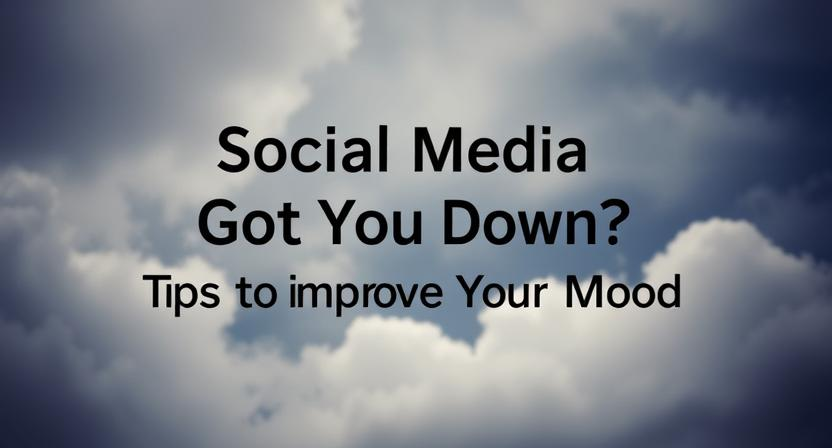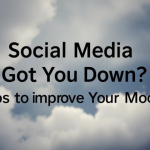In today’s digital age, social media has become an integral part of our lives. From Instagram and Facebook to Twitter and TikTok, these platforms offer an endless stream of content that can both entertain and connect us with others. However, if you’ve found yourself scrolling aimlessly and feeling drained, anxious, or even sad, you’re not alone. Social media can sometimes have a negative impact on mental health, leaving users feeling overwhelmed or down.
The constant comparison to others, the pursuit of likes, and the pressure to present a perfect life can contribute to stress, self-doubt, and decreased well-being. But don’t worry—there are ways to take control of your social media experience and lift your spirits. Here are some practical tips to help improve your mood if social media is starting to bring you down.
1. Recognize the Impact of Social Media on Your Mood
The first step toward improving your mental health is acknowledging the effect social media has on your mood. It’s easy to get caught up in a cycle of comparison, where you feel inadequate or left out after seeing someone else’s seemingly perfect life. According to various studies, excessive social media use can contribute to feelings of anxiety, depression, and loneliness.
Be honest with yourself about how social media is making you feel. Do certain posts trigger negative thoughts? Do you often find yourself comparing your life to others? Understanding the impact social media has on your emotions is the first step in changing the narrative.
2. Curate Your Social Media Feed
One of the easiest ways to improve your mood is by curating your social media feed to include content that makes you feel good. Instead of mindlessly scrolling through posts that leave you feeling inferior or upset, follow accounts that inspire, motivate, and uplift you.
You have the power to follow pages, people, and communities that align with your values, interests, and passions. Whether it’s motivational quotes, fitness journeys, or cooking inspiration, fill your feed with things that make you feel empowered and positive. Unfollow accounts that trigger negative emotions, and don’t hesitate to mute or block posts that affect your well-being.
3. Limit Your Screen Time
Sometimes, the best way to take care of your mental health is to step away from your phone. Social media can become all-consuming if you’re not mindful of your screen time. The constant influx of information, notifications, and updates can lead to burnout and stress.
Consider setting limits on your daily social media usage. Most smartphones have built-in screen time trackers that allow you to monitor and restrict how long you spend on social platforms. You can also enable Do Not Disturb mode or use apps designed to help you stay focused and reduce distractions.
Taking regular breaks from social media can help reduce the pressure and allow you to reconnect with yourself and the real world around you.
4. Practice Mindfulness and Stay Present
Mindfulness is a powerful tool that can improve your mood and overall mental health. Instead of mindlessly scrolling through your feed, take time to focus on the present moment. Pay attention to your surroundings, breathe deeply, and engage in activities that bring you joy and relaxation.
If you find yourself getting caught up in negative thoughts while using social media, practice mindfulness techniques. Take a moment to pause and ground yourself. This could mean taking a few deep breaths, focusing on your senses, or even doing a short meditation. Mindfulness helps reduce stress and keeps your mind focused on the here and now, rather than getting lost in comparison or unrealistic expectations set by others.
5. Set Boundaries for Social Media Use
Setting boundaries around social media usage is key to protecting your mental well-being. For example, avoid using social media as soon as you wake up or just before you go to bed. Starting or ending your day with a screen can disrupt your mood and your sleep cycle, which can affect your overall health.
Instead, establish boundaries such as limiting social media use to specific times of day, or setting designated times for checking notifications. By doing so, you give yourself permission to be present in other areas of life—whether it’s spending time with loved ones, exercising, or engaging in a hobby. This can create a healthier balance between the virtual and real worlds, reducing stress and increasing your happiness.
6. Engage in Offline Activities
One of the best ways to counteract the negative effects of social media is by engaging in offline activities that nourish your body, mind, and soul. Exercise, reading, cooking, or spending quality time with friends and family can all help lift your mood and shift your focus away from the digital world.
Physical activity, in particular, is a powerful tool for improving your mood. Exercise releases endorphins, which are natural mood boosters. Whether it’s going for a walk, hitting the gym, or practicing yoga, incorporating movement into your day can help combat the negative feelings triggered by social media.
7. Practice Gratitude
Social media often leads to feelings of inadequacy, especially when it seems like everyone else is living a picture-perfect life. One effective way to counter this is by practicing gratitude. Take a moment each day to reflect on what you’re grateful for—whether it’s your health, a supportive friend, or a recent achievement.
When you start to focus on the positive aspects of your own life, it becomes easier to let go of comparisons and embrace your unique journey. Gratitude can shift your mindset from scarcity to abundance, making it easier to appreciate the good things in your life rather than focusing on what you don’t have.
8. Connect with Others Authentically
Social media often encourages surface-level interactions that can leave you feeling disconnected or lonely. To improve your mood, focus on building deeper, more meaningful connections. Rather than engaging in passive scrolling, make an effort to connect with friends, family, or online communities in a more authentic way.
Reach out to people who support and uplift you. Have a real conversation, share your thoughts, and express your feelings. Authentic connections can provide a sense of belonging and emotional support, which is vital for mental well-being.
9. Seek Professional Help if Needed
If you find that social media is significantly affecting your mood or mental health, it may be time to seek professional support. A counselor, therapist, or mental health professional can help you navigate the challenges associated with social media use and guide you in developing healthier coping strategies.
There’s no shame in seeking help, and sometimes talking to a professional can make all the difference in improving your mental health and overall happiness.
Final Thoughts
Social media doesn’t have to bring you down. By being mindful of your usage, curating your feed, and engaging in offline activities, you can create a healthier relationship with social platforms. Remember that you are in control of what you consume and how you let it affect your mood. By taking steps to protect your mental health, you can enjoy the benefits of social media without letting it negatively impact your well-being.
Ultimately, you deserve to feel good about yourself—both online and offline. By following these tips, you can begin to cultivate a more positive and fulfilling experience on social media, helping to improve your mood and your mental health.






Leave a Reply